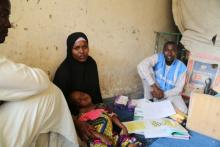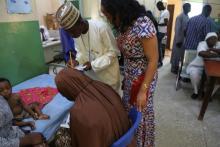Recently liberated communities in Borno state benefit from Integrated Management of Childhood Illnesses
7 October 2016 - The World Health Organization is supporting the State Minsitry of Health in Borno State to deploy community resource persons (CORPs) trained on community integrated management of childhood Illness (cIMCI) and provision of integrated community case management of childhood illnesses (iCCM) to liberated areas of Borno.
With the support from the WHO, trained community members on IMCI are deployed to Internally Displaced Persons (IDP) camps to treat children with minor ailments such as diarrhoea, malaria, pneumonia while those found with serious health conditions are referred to nearby health facilities for further care. CORPs also promote the practice of exclusive breast feeding, hand washing, complimentary feeding and other key household practices to caregivers.
Hajia Nuur, living in Mogcolis internally displaced persons (IDP) camp in Borno State stated that just like other mothers, she is a beneficiary of the WHO-supported CORPS programme in her camp.
”I have lived in this camp for the last two years. For five month, mothers like me had challenges of accessing basic health care services for our children. However, one day we were informed that we heard that some peoples in the camp were now available to deliver services to us round the clock”.
The mother of two further explained that “I particularly remember on one occasion, my child developed terrible diarrhoea at mid night, and it was progressing fast. It is easy to lose your child at that time of the night due to limited access to hospitals coupled with the fragile nature of the security situation. There are no health facilities near our camp, so this came in very handy. My only source of rescue that night was the CORPs”.
Already, WHO with support from USAID humanitarian grant has concluded the additional training for 28 CORPs on in Integrated Management of Childhood Illness and on the provision of integrated community case management of childhood illnesses (iCCM). Those trained will serve people in 14 satellite camps and host communities in the newly liberated areas in Borno State.
“The participants are selected from the communities by their community and camp leaders with the support of the State Ministry of Health and guidance from the Federal Ministry of Health. Those participating in the current training will serve an estimated population of 265 860 IDPs and host communities including 47,751 children under five years,” Dr Joy Ufere of WHO Nigeria stated.
“We are committed to making sure that all people with limited access to basic health services in all security compromised areas and those that have been liberated get access to treatment of common ailments” Dr Ufere added.
The first phase of the capacity building focused on community integrated management of childhood illnesses with emphasis on promotion of 19 key household practices (cIMCI) like hand washing, exclusive breastfeeding and many others while the second phase focused on the provision of iCCM. The training was conducted in a period of two weeks. WHO will provide the CORPs with medical supplies including: Amoxicillin, ACTs, analgesics, Zinc/ ORS and Malaria Rapid Diagnostic Test Kits for case management and Mid-upper arm circumference strip for malnutrition assessment
In addition to the capacity building of the CORPs, WHO is also supporting the Borno State Ministry of Health through the State Primary Health Care Development Agency to build capacity of health workers’ to implement Emergency Obstetric and New-born Care (EmONC) services in humanitarian settings, strengthen community (IDPs camp) capacity for management of maternal and child health and strengthened routine immunization services, progress towards polio eradication and disease surveillance.
Since the commencement of the program in April 2016, a total of 30 state programme managers have been trained on iCCM/cIMCI to support interventions and supervise community activities; 25 Community Health Extension Workers (CHEWs) trained on iCCM and IMCI as supervisors from PHCs in host communities and Camp Clinics including 10 in Borno, 5 each in Yobe and Adamawa. A total of 100 CORPs from 15 IDP camps and 45 host communities including 50 from Borno and 25 each from Adamawa and Yobe states have also been trained to ICCM and community IMCI key household practices CIMCI.
By the end of August 2016, over 10,000 children under the age of five years in IDPs camps and host communities in accessible areas had been served. As new areas get liberated, WHO will continue to support the Ministry of Health to scale up its response to ensure that all displaced people and those with less access to the basic primary health services are better served.
_______________________________________________
Technical contact:
Dr Mary Stephen: +234 816 289 9789; Email: stephenm [at] who.int">stephenm [at] who.int
Media contacts:
Ms Kulchumi Hammanyero; Tel: +234 803 632 7360; Email: hammanyerok [at] who.int"> hammanyerok [at] who.int
Ms. Pauline Ajello; Tel: +234 803 402 2388; Email: ajellopa [at] who.int">ajellopa [at] who.int
_______________________________________________
01 Dr Joy Ufere works with Community Resource Persons (CORPS) trainees to identify case of acute respiratory infection in a children’s ward at Maiduguri Specialist hospital
02 Hajia Nuur one of the beneficiaries of WHO supported CORP programme


